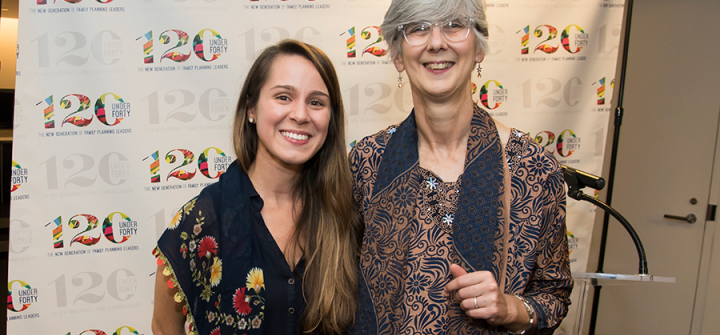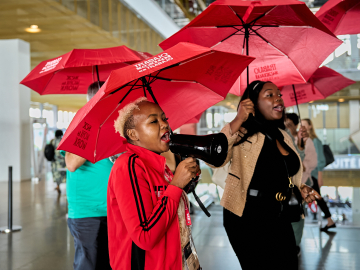Engaging Youth, Meaningfully: Q&A with Burcu Bozkurt
Burcu Bozkurt, the 120 Under 40 leader closing out GHN’s special Q&A series, has done everything from providing technical support to establish an M&E system for community health workers in Bangladesh to working with women’s cooperatives in Turkey, her home country.
Now the director of operations at the International Youth Alliance for Family Planning (IYAFP), Burcu is working on her PhD at the University of North Carolina Gillings School of Public Health. She received a $10,000 award from the Phillips Ambassadors Program—which provides travel grants to Asia to University of North Carolina at Chapel Hill students who demonstrate leadership, intellectual curiosity, communication skills and a commitment to generous service— to pursue advocacy and youth-centered projects in Burma, the Philippines and Vietnam this past summer.
120 Under 40, organized by the Bill & Melinda Gates Institute for Population and Reproductive Health at the Johns Hopkins Bloomberg School of Public Health and sponsored by Bayer, shines a light on the “positive disruptions” made by young leaders in family planning.
In your work in Asia this summer, are you finding that young people are eager to share their stories? What are the most surprising things you are learning?
Youth were very eager to share their stories with me. Leading IYAFP gave me a head start connecting to some youth via social media/WhatsApp ahead of my trip. It also helped that I came to the table with my own set of experiences as a fellow youth, ready to share.
One of the most surprising things I picked up were how similar our stories were around youth tokenization. Even though we all either conduct SRH research or advocacy work thousands and thousands of miles apart, we have all been approached at the last minute, or put on a panel where we’ve been expected to speak on behalf of all the youth of our generation. We’ve all been interviewed about our “experiences,” and never heard back about what came of our insights. I hope the family planning community takes this as a reminder to be intentional in how youth can be sustainably engaged in this very important work.
Second, even as eloquent, informed youth advocates, we all struggled with how to change the misconceptions and mindsets of those closest to us surrounding sex and reproductive health. Only a few of the youth I talked to had parents who knew of, and truly encouraged, their work. The rest of us were left scratching our heads on how to have or facilitate tough conversations around youth rights, sexuality, and contraception. It’s hard to do, and not a common area of support offered to youth.
Within the field of family planning, what issues regarding youth do you feel are most underreported or important to fix a spotlight on?
Youth face very different obstacles to family planning depending on their context, as my conversations in Asia this summer certainly underlined. However, common elements among youth around the world include the importance of comprehensive sexuality education, because it can lay the foundation for youth to be strong advocates for themselves. It was so interesting to hear how early some of the pervasive reproductive health misconceptions begin.
Quality of care for youth is another important issue. For many youth, that means method mix, and as a result, IYAFP has focused more on access to long-acting reversible contraception for young people. Adolescents should have access to a full range of methods and accurate information about those methods, so that they can make empowered decisions about their reproductive health. No two youth are the same, so options are key to make family planning efforts more effective.
Most importantly, a lot of my conversations with our country coordinators and potential partners this past summer revolved around how to engage youth as equal stakeholders in policy development and implementation. I recently heard a quote that speaks to this: “Every system is perfectly designed to get the results it gets.” If our health care systems are failing youth on family planning, it’s probably because youth have been left out of the conversation for far too long.
What commonalities are you finding between your experience as a young Turkish woman living in the US, and the young people you met in Asia?
The most striking commonality I noticed was the overwhelming responsibility we all feel to look out for the world around us and create some lasting change. We are all contagiously passionate about some of the world’s most stubborn problems. Maybe it’s generational exceptionalism, maybe it isn’t—but there is something to be said about how hard we work, on top of our day-jobs as students, caretakers, and professionals, to create better paths for those who come after us.
As a Phillips Ambassador scholar researching topics including provider attitudes on abortion in Vietnam, what did you discover and how did it shape your contributions to the family planning field?
So many of my conversations in 2011 pointed to the overwhelming stigma that still exists around youth sexuality. The stakeholders I interviewed talked about how this stigma meant that youth frequently did not receive the high-quality care they deserved because their providers often passed judgement—and how youth often lacked advocates to stand up for them. This research catapulted into something much larger than I could have ever dreamed; I attended ICFP in 2013 as a youth delegate, and later, ended up co-founding IYAFP.
What do you feel should be done to amplify women’s voices surrounding reproductive health issues—particularly those of young women, and particularly in places where the freedom of speech is threatened?
First, I believe we can’t put the onus on young women for speaking out in countries (like my home country of Turkey) where their safety or livelihoods would be threatened. We have to approach these issues more creatively—perhaps by finding and sustaining local and regional partners better positioned to empower and support young women as advocates. They are closer to the ground, more likely to think through the strategic implications of advocacy in restrictive settings, and more experienced in dealing with potential fall-out. I think the internet can also be a magical place, and though many countries are actively censoring websites, encrypted social media and messaging channels can still help connect advocates across borders. Last, but not least, research documenting trends can play a critical role in raising awareness of women’s experiences.
For those of us privileged enough to live in places with freedom of speech, our role is to remain informed, share good information sources, and consistently hold our own governments accountable for speaking out against human rights infringements.
You’ve mentioned that your grandmother inspired you to get involved in family planning; can you share that story and how that shaped your path?
My grandmother married in her mid-teens and went on to have 5 children. Because of inadequate family planning knowledge and services, my grandmother not only lost out on her education, but also missed the valuable social and financial capital that a job would have provided. That social capital included important information-sharing opportunities regarding anti-domestic abuse laws, or health care access, for example. Don’t get me wrong – my grandmother was outspoken and a heroine in her own right. She advocated for education for her daughters—an opportunity she never had. But her social and cultural surroundings gave her no choice but to be a mother at a young age, inconvertibly changing her life course. It limited her education, her skillsets and development, and ultimately, her role and voice in family dynamics. I’m involved in family planning now not only because of what she did for my mother and me, but also because I believe women shouldn’t have to go through what she went through.
This interview has been edited for clarity and length.
Join the thousands of subscribers who rely on Global Health NOW summaries and exclusive articles for the latest public health news. Sign up for our free weekday enewsletter, and please share the link with friends and colleagues: Subscribe to GHN
Burcu Bozkurt with Ellen Starbird, Director of USAID's Office of Population and Reproductive Health.





